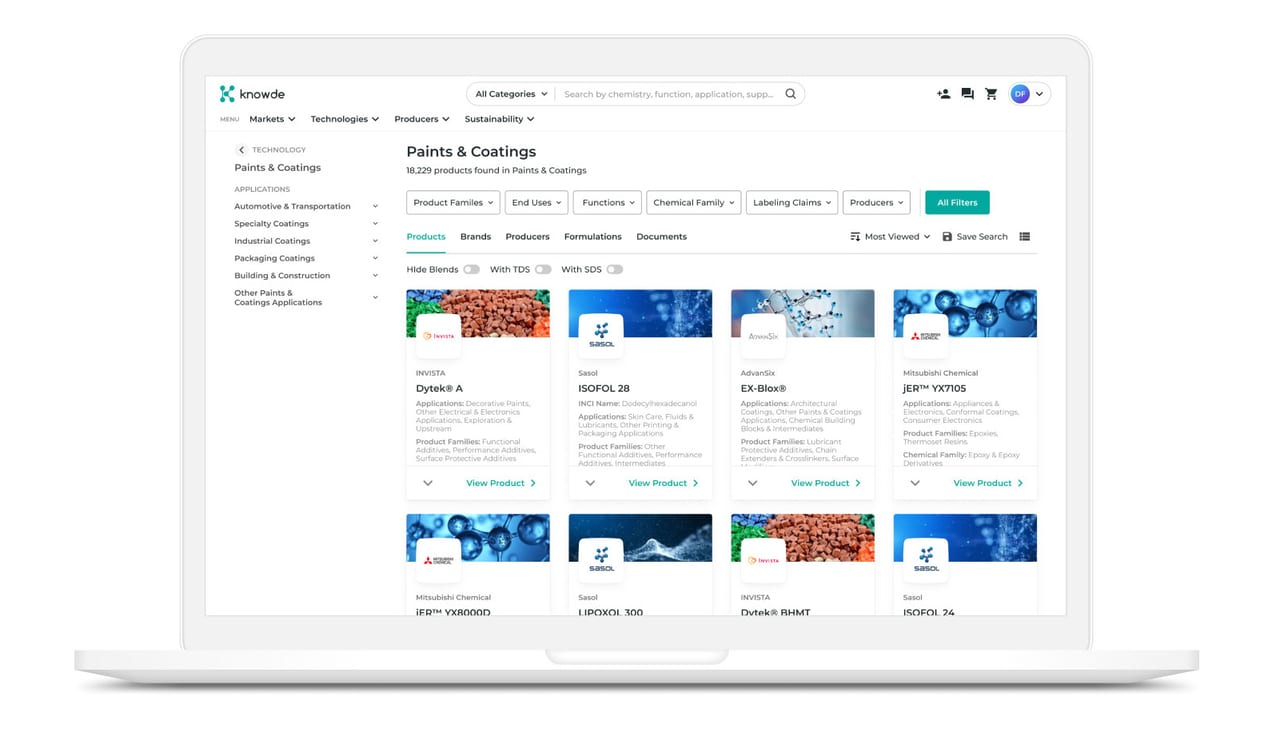Ready to proof -- Clare 1/11/22
KJ proofed on 1/11 and sent one correction
Revised on 1/12
Ready for author
Online Marketplaces Are Moving the Industry Towards Digitalization
Video: Fritz Jorgensen, Creatas Video+/Getty Images Plus, via Getty Images
By John Schmidt, Senior Content Writer, Knowde, San Jose, CA
The most significant development in the paint and coatings industry since the pandemic began is not the latest resin, solvent or additive — it’s the way these ingredients can now be bought and sold. Online marketplaces are emerging, bringing with them the speed, ease and convenience of the modern e-commerce experience to the industry.
The best news for paint and coatings manufacturers? With these digital platforms, they can avoid the pain points that have been associated with a buying and selling process that hasn't changed in nearly a century.
There are also benefits for suppliers, whether they are large chemical companies or niche ingredient providers. While many of these companies have spent the past few years trying to scale up a digital platform, the process has been slow and expensive. Digital marketplaces offer suppliers the opportunity to move online quickly, without the need or risk of further investments.

Rather than searching multiple companies’ websites to find binders, resins, solvents and additives, formulators can use digital marketplaces to find everything they need in one place.
The Buying Journey, Reimagined
For research and development (R&D) professionals, the process of finding, researching, testing and getting raw materials approved has traditionally been time-consuming, complex and frustrating. For years, larger paint and coatings companies relied on suppliers sending sales people, printed brochures and catalogs to aid their search for new ingredients. Smaller manufacturers were not as fortunate; their only opportunities to meet big suppliers took place at trade shows. Often, when they sought out a supplier, they were referred to a distributor, who may or may not have been able to answer technical questions.
Both large and small paint and coating manufacturers did have some common headaches, as well: getting specified samples to the right labs, the frustration of having a preferred vendor unable to supply materials and trying to source an alternative provider, and dealing with inefficient logistics and tracking systems are just a few examples.
“Marketplaces are designed to take this friction out of the buying process,” said Janakiraman Swamy, Chief Knowledge Officer at Knowde. “They eliminate the need to search through multiple vendor websites, which is often complicated by product information being outdated, kept behind a firewall, or simply unavailable. With a digital marketplace, they can search for what they need quickly and easily, and have access to technical information and product documents from many suppliers.”
Additionally, marketplaces do something that even trade shows can’t: They put both large and small manufacturers on equal footing. “A great deal of innovation is done by smaller companies and independent researchers,” Swamy said. “For them, identifying raw materials, getting samples and being able to scale up to production is more difficult. One of the advantages that online marketplaces bring is that they will help speed up the R&D process and help companies of all sizes get products to market faster.”
Another benefit of digital marketplaces is how they meet the needs of current-generation R&D and procurement professionals. Accustomed to doing everything in their personal lives on the internet, these young professionals and emerging leaders expect to conduct business the same way. Unfortunately, many ingredients manufacturers simply don’t have the capability to meet that customer expectation.
The Supplier Dilemma
Ingredients manufacturers have been investigating digitalization for several years. Many have invested millions of dollars and created strategies and built teams in an effort to drive their digital transformation. That was before the pandemic.
Once COVID-19 forced the shutdown of their sales and marketing teams, who could no longer make customer calls or attend trade shows, many suppliers struggled to stay connected to their customers. Others were ahead of the curve, and accepted invitations to join a marketplace.
“One of the first companies to join Knowde was interested simply in expanding its online presence. This company had built its own ecommerce capabilities prior to the Coronavirus, and presumed that the shutdown would create an increase in transactions on its website. It had no expectations for what a marketplace could do,” said Swamy.
“At the end of the year, the company realized its website traffic had actually decreased. But while this was happening, the number of visitors to its Knowde storefront was growing significantly, and generating sales leads,” he added.
The ability to achieve digitalization in weeks, rather than months or years, is one of the most important benefits that marketplaces can offer suppliers.
“There’s no need to overthink it. A lot of times, suppliers are trying to figure out what might happen in a year, two years, even five years in the future. Typically, we suggest that they try it, and see how it works for them,” said Swamy. “The truth is that their customers want a better buying experience now, which they can have with a marketplace.”
One of the industry’s leading suppliers, AdvanSix, recently launched a storefront on Knowde, and acknowledged the role that marketplaces could play in the future.
“A digital marketplace is providing a growth opportunity for us to broaden our reach into many markets, including paints and coatings. We know there are formulators and others who are looking for reliable products with various attributes and benefits to suit their applications,” said Paul Sanders, Vice President and Business Director for Chemical Intermediates at AdvanSix. “Our storefront is a tool for lead generation, and we'll continue exploring how this can play forward for us in the future.”
How Marketplaces Work
Marketplaces provide an ecosystem for economic commerce, connecting buyers to suppliers from a first encounter through the completion of a transaction. Unlike a buyer-centric platform like Amazon, a marketplace for paint and coatings ingredients as well as the entire chemical industry has to consider the needs of both buyers and sellers.
“Paint and coatings companies want a simpler process to search, filter, collaborate, request samples and quotes, and purchase everything they need. Suppliers don’t want their products to be commoditized. They want to differentiate their brands and promote their value proposition. That’s why a marketplace for this industry has to be balanced,” said Swamy.
In Knowde’s case, R&D and purchasing professionals are offered free sign-up with access to any supplier’s storefront and the ability to contact sellers directly or get help from a concierge service. Suppliers can choose a basic or premium storefront, with the latter including digital marketing tools to drive storefront traffic, analytics to guide data-driven decision making, and ecommerce capabilities to fulfill customer orders.
“Marketplaces don’t replace direct sales or distributors. They’re an additional channel for doing business. And unlike B2C platforms, they actually humanize the digital experience. Buyers can connect to sellers, ask questions and build relationships,” said Swamy. “I would expect marketplaces to continue to grow in popularity, and for their functionality to continue to evolve going forward.”
For more information, visit www.knowde.com.
